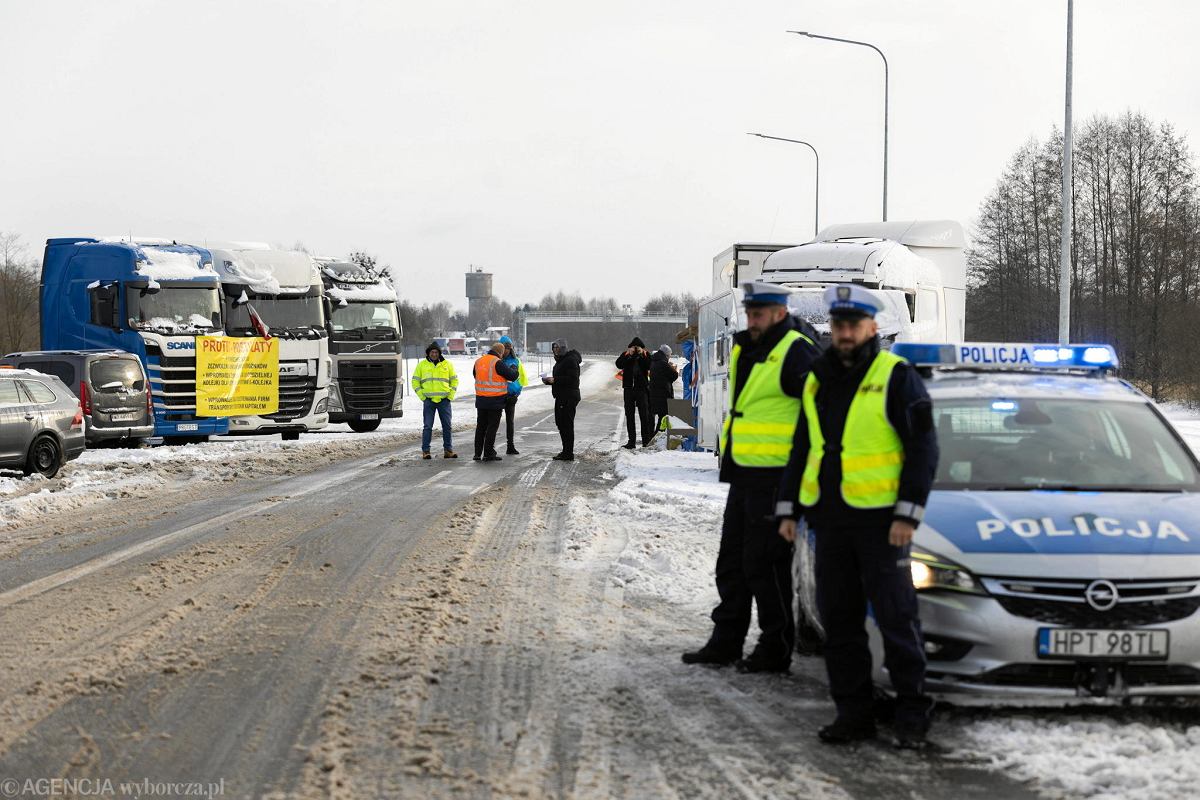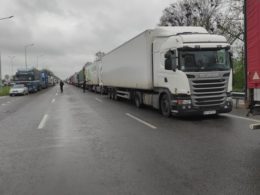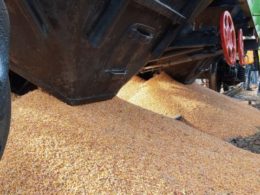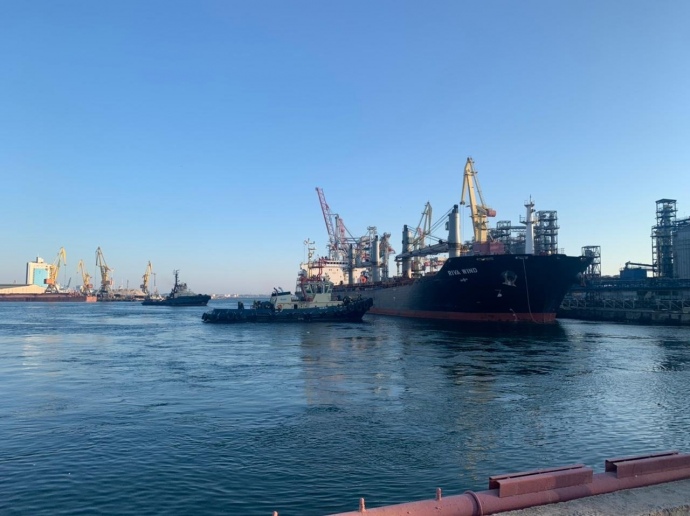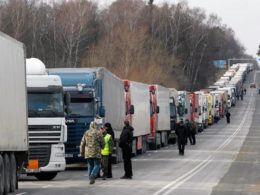Polish protesters resumed blocking the Yahodyn-Dorohusk border crossing with Ukraine on 18 December, the State Border Guard Service of Ukraine-Western Border said.
It’s the fourth checkpoint on the border with Poland that is blocked. According to Ukraine’s Federation of Employers, the Ukrainian economy has already lost at least €400 million due to interference in the export of goods since 6 November, when Polish protesters started blocking the border checkpoints.
Protest organizers the Yahodyn-Dorohusk border crossing plan to let one truck per hour pass through, the State Border Guard Service of Ukraine-Western Border said, citing Polish counterparts. Polish carriers also said they would pass Ukrainian truckers for hazardous, humanitarian goods, animal transports and bus traffic.
Polish farmers from United Village joined Polish hauliers who are blocking the border Yahodyn-Dorohusk checkpoint again, the organiser of the Polish protest, Rafal Mekler, said on X (Twitter), on 17 December.
Rafal Mekler, in particular, used to trade with Russia actively before the full-scale invasion, Euromaidan Press previously reported, citing Guildhall investigation. Other protest organizers also have close business and political ties to Russia: some supported Russia’s occupation of Crimea earlier, and some voted against condemning Russian war crimes, according to the investigation.
Why did protesters resume blocking the Yahodyn-Dorohusk checkpoint?
On 6 November, dozens of Polish truck drivers blocked
three border crossings with Ukraine, with concerns about increased competition from Ukrainian hauliers after the liberalization of cross-border shipping rules between Ukraine and the EU. Protesters expanded it to a fourth crossing soon.
The blockade has caused enormous queues at border points, with wait times stretching days, even weeks. Nearly 3,000 trucks were stuck at the Polish-Ukrainian border.
On 13 November, Ukraine and Poland held talks at the countries’ border but failed. The protesters’ main demand was "unrealistic because the permit system was abolished by a Ukraine-EU transport deal in place until June 2024," Ukraine’s Deputy Infrastructure Minister Sergiy Derkach said.
On 11 December, Polish protesters unblocked one of the border crossings, Yahodyn-Dorohusk checkpoint, on demand of Dorohusk Mayor Wojciech Sawa, Ukraine’s Infrastructure Minister Oleksandr Kubrakov said. Reportedly, the blockade’s end came as a result of “numerous meetings and negotiations at various levels” between the Ministry’s team and the Embassy. The same day, rally participants petitioned the court.
Days later, Polish hauliers re-applied to block Yahodyn-Dorohusk. However, local authorities denied the request.
On 15 December, Lublin Regional Court overruled Dorohusk authorities' ban on gatherings, allowing organizers to resume the border protest, Radio Lublin reported.
"Ukraine and the EU view the Polish demands as unacceptable and discriminatory towards other countries, a position confirmed during a recent Ukraine-Poland-EU Coordination Platform meeting (DG MOVE) on 30 November," Ukraine’s Ministry of Development of Communities, Territories and Infrastructure reported.
Ukraine's human and financial losses due to Polish hauliers' protest
Recently selected Prime Minister Donald Tusk vowed to quickly solve issues related to a truckers’ protest on several border crossings with Ukraine. However, after more than a month of protest at 4 checkpoints on the Polish-Ukrainian border, Ukraine's losses are already irreparable.
On 16 December, a truck driver died due to a strike by Polish carriers at the Krakivets-Korczowa checkpoint, Volodymyr Balin, Vice President of the Association of International Road Carriers, said to Suspilne.
This is the third case of a Ukrainian driver’s death since the start of the blockade of Ukrainian-Polish checkpoints. On 11 November, a 54-year-old truck driver from Ukraine died in a parking lot near the Yahodyn-Dorohusk checkpoint in Poland while waiting to cross the border. On 23 November, another Ukrainian driver died in Poland in a parking lot near the Korczowa-Krakivets checkpoint.
“Yahodyn-Dorohusk checkpoint is the most problematic one. In the entire distance to Helm is about 30 kilometres. There is nothing — neither gas stations nor shops — it is just a road. A kilometre away from the checkpoint itself is a miniature roadblock. There are several trucks without trailers, several people and a police car,” Oleksandr Masovets, who witnessed the blockade, said.
As of the beginning of December, the economy of Ukraine has already lost at least €400 million, Euromaidan Press reported
, citing Ukraine’s Federation of Employers. However, Polish entrepreneurs also suffer from the blockade since Polish exports can’t be moved to Ukraine properly.
Border blocking interfered with the delivery of military aid to Ukraine
The worst part is that the blockade also hits Ukrainian defense capabilities. On 25 November, Lviv Mayor Andriy Sadovy said that the Poles are not allowing important cargo for the Ukrainian Armed Forces to pass through.
Polish authorities claimed the protesters don’t interfere in the delivery of military aid to Ukraine. However, this applies only to official governmental transfers. All military products delivered to Ukraine by volunteer organizations are forced to stay in the general queue, affecting Ukraine’s ability to defend itself.
Polish authorities claimed the protesters don’t interfere with the delivery of military aid to Ukraine. However, this only applies to official governmental transfers. All military products delivered to Ukraine by volunteer organizations are forced to stay in the general queue, affecting Ukraine’s ability to defend itself.
The head of the Come Back Alive Charitable Foundation, Taras Chmut, said Radio Liberty that the protests by Polish truckers and farmers "slow down the delivery of certain products, such as pickup trucks, night vision devices or quadcopters coming from abroad for a certain period."
"They are getting through, but where it used to take a day, now it can take two or three weeks," he said.
Chmut said that the foundation had appealed to state authorities to resolve this issue or tried to resolve the problems locally.
"The state is trying to regulate volunteer work for various reasons. In particular, they launched legislative changes that came into force on 1 December," the head of the Come Back Alive Charitable Foundation explained.
On 1 December, the Cabinet of Ministers passed a decree with new rules for importing humanitarian aid into Ukraine. The main goal of the changes is to "strengthen control over budgetary institutions receiving this assistance and prevent abuse." In particular, under the decree, only military vehicles can now be imported duty-free, while NGOs and charities lost the ability to easily register cars for their use.
Read also:
- More than 2000 trucks waiting in line on Polish-Ukrainian border amid blockade
- Finnish PM labels Russian border situation a hybrid attack
- Slovak truckers end protest at border crossing with Ukraine
- Ukraine military aid stranded by Polish border blockade

